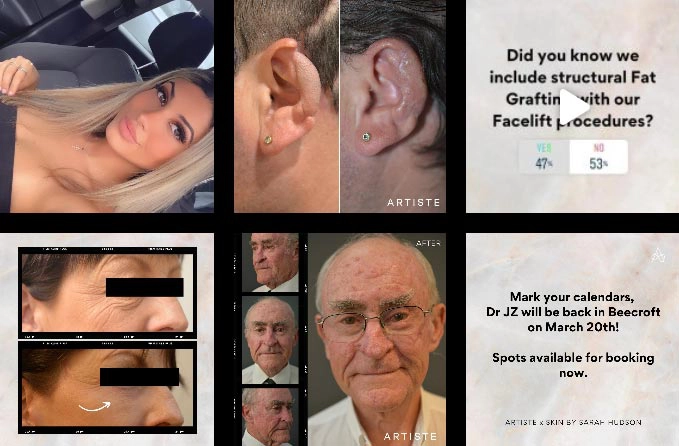Possible Reasons Why Eyelid Surgery May Cause Dry Eyes
Model featured in photography
Eyelid surgery, known as blepharoplasty, is a procedure that involves making changes on the eyelids for functional or aesthetic purposes. While many people undergo this surgery with minimal complications, some may experience temporary discomfort, including symptoms associated with dry eyes.
Can Eyelid Surgery Cause Dry Eyes?
It’s a common question for those considering the procedure. Some people may experience dry eyes afterward, which may feel uncomfortable or make certain activities, like wearing contact lenses, more noticeable. Understanding why this occurs can help individuals better prepare and manage their post-operative recovery. Below, we outline some possible reasons for this condition.
It is important to remember that individual experiences can vary, and it is essential to consult your healthcare provider if you experience any discomfort related to surgery.
Changes in Eyelid Anatomy
The anatomy and positioning of the eyelids play a crucial role in maintaining eye health. The eyelids help distribute tears across the surface of the eye, ensuring it remains lubricated. During eyelid surgery, alterations to the shape or position of the eyelids can sometimes impact this natural tear distribution. For example, if the eyelids do not fully close post-surgery, it can lead to increased tear evaporation and symptoms of dryness.
Temporary Disruption of Tear Production
Tear production involves a complex interaction between various glands and tissues around the eyes. Surgery in this area may temporarily disrupt these processes. The delicate tissues involved in tear production may become irritated or inflamed, potentially leading to reduced tear secretion. This temporary reduction may result in feelings of dryness or discomfort until the tissues heal and tear production returns to its normal state.
Post-Operative Swelling
Swelling is a common response to surgery as the body works to heal itself. Following eyelid surgery, swelling around the eyes may affect the normal function of the eyelids and tear ducts. This swelling might interfere with how tears are spread across the eye or how they drain, contributing to sensations of dryness. Swelling typically subsides over time as the healing process progresses.
Managing Dry Eye Symptoms
For those experiencing dry eyes after eyelid surgery, there are several ways to manage symptoms. However, it is always important to follow your surgeon’s advice for personalised instructions.
- Lubricating Eye Drops: Artificial tears may help alleviate discomfort by providing additional moisture to the eyes.
- Cold Compresses: Applying a cold compress to the area may reduce swelling.
- Follow-Up Care: Regular check-ins with your healthcare provider are essential to monitor recovery and address any concerns promptly.
Importance of Personalised Advice
It is important to remember that everyone’s experience with eyelid surgery is unique. Factors such as the specific procedure performed, individual anatomy, and pre-existing eye conditions can all influence post-operative outcomes. For this reason, if you are considering eyelid surgery or are concerned about dry eye symptoms, it is essential to consult a qualified plastic surgeon such as Dr Jack Zoumaras. During your consultation, he can provide personalised advice tailored to your specific needs and circumstances. Book a consultation today.
Disclaimer: At Artiste Plastic Surgery, our Plastic Surgeons led by Dr Jack Zoumaras have been trained to the highest possible degree. All surgery has risks and it is always advised to get a second opinion. Risks are very real and we cannot guarantee any result. Results are illustrated as a guide only. All risks are managed and any need for revision surgery or complications (1-5%) can be managed by our specialist plastic surgeons.
Any statements on how you will feel is based on Level V Evidence:
Level V: How you will feel after plastic surgery varies between individuals, depending on psychological and physical factors. Our internal research is based on how patients in our practice feel after surgery.
The blogs are not a substitute for a medical consultation and do not form as part of the doctor to patient relationship.
SHARE THIS ARTICLE
Jul01
Facelift Recovery Tips: What Speeds Up Healing and What to Avoid
Disclaimer: At Artiste Plastic Surgery, our Plastic Surgeons led by Dr Jack Zoumaras have been trained to the highest possible degree. All surgery has risks and it is always advised ...
Jul01
How to Prepare for Facelift Surgery: What to Do Before Your Big Day
Disclaimer: At Artiste Plastic Surgery, our Plastic Surgeons led by Dr Jack Zoumaras have been trained to the highest possible degree. All surgery has risks and it is always advised ...
ABOUT ARTISTE
Artiste Plastic Surgery is an Award Winning Specialist Plastic Surgery practice led by internationally trained Dr. Jack Zoumaras, Plastic Surgeon and Peer Reviewed Face Surgeon
Artiste offers the latest Cosmetic Surgical Procedures of the Face, Breast and Body, inspired from leading centres around the world.
STAY IN THE LOOP
Enter your email address below to receive updates on new articles and VIP access to promotions and special offers.
FOLLOW US ON INSTAGRAM










